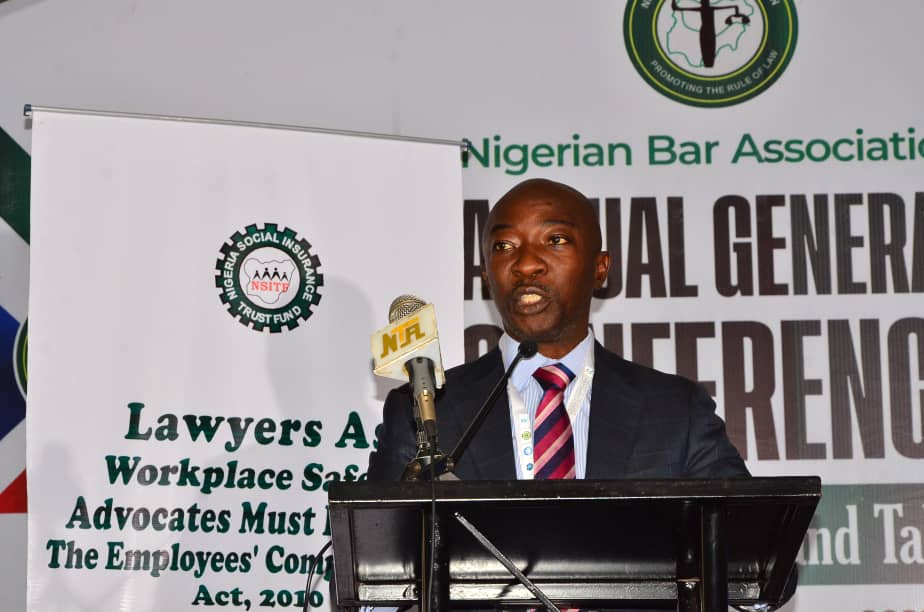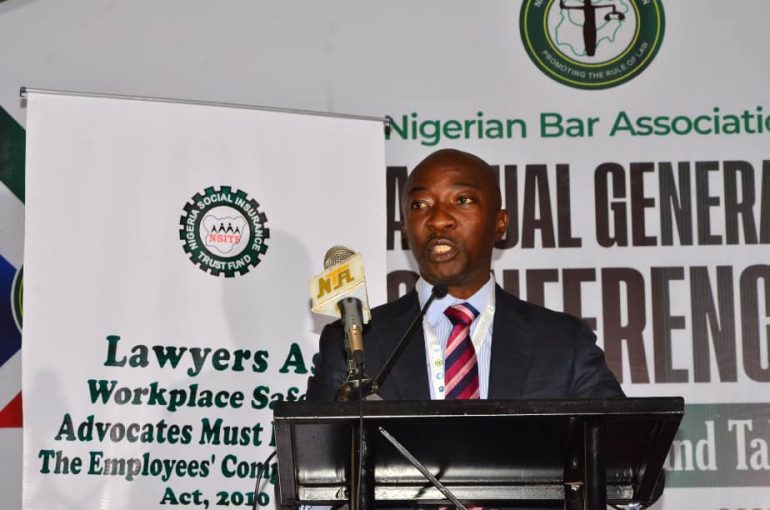Listeners:
Top listeners:
-
play_arrow
104.9FM Best rock music demo
-
play_arrow
Demo Radio Nr.1 For New Music And All The Hits!
-
play_arrow
Demo Radio Techno Top Music Radio
-
 play_arrow
play_arrow
Police Commissioner Launches Weapon and Riot Control Training for FCT Officers Democracy Radio
Compliance: Lawyers Urged to Lead Advocacy on Employees’ Compensation Scheme

By Chinedu Echianu
Legal practitioners In Nigeria have been urged to be advocates of the Employees’ Compensation Scheme (ECS) and show example through compliance in their various Chambers.
This was the view of the Managing Director of Nigeria Social Insurance Trust Fund (NSITF), Barrister Oluwaṣeun Faleye, at the 65th NBA Annual Conference in Enugu.
“The implementation and impact of the Employees’ Compensation Act, 2010 cannot rest on the NSITF alone. Like every piece of transformative legislation, the ECA lives and breathes through the interpretation, advocacy, and enforcement carried out by lawyers, judges, and policymakers,” Barrister Faleye said.
Speaking further he said, “Apart from our expectation of you as advocates of the efficacy of the Employees’ Compensation Scheme, the most crucial expectation we have of you lawyers and leaders of the bar here is to lead by example. We must comply with the law ourselves. We must ensure that all law firms practicing in Nigeria subscribe to the Employees’ Compensation Scheme.”

The NSITF’s Managing-Director who presented the lead paper titled: “Enhancing Workplace Safety and Social Protection: The Role of Employees’ Compensation Act 2010” at the Vl Breakout Session, further solicited making compliance with the ECA a prerequisite for becoming a Senior Advocate of Nigeria.
He enumerated occupational hazards and risks in the legal profession to include injuries, disabilities and deaths from accidents while travelling for work, diseases such as acute back pain from sitting down for long stretches and mental breakdowns.
“As you all know, law practice, particularly those of our colleagues engaged in dispute resolution practice, comes with its risks. Lawyers travel to different parts of this country practicing their trade, advocating and defending clients. These journeys come with risks. For the corporate and commercial lawyers, we tend to sit for hours reviewing documents amongst other things leading to back injury. The pressure of work could sometimes lead not only to physical challenges but to mental stress. Yet, majority of our law firms are not complying with the Employees’ Compensation Scheme,” he lamented.
“The NBA must do more and ensure that all law firms comply with the Employees’ Compensation Act to safeguard our workforce.
“We must ensure that compliance evidence becomes part of the documentation for taking silk. As part of the law firm inspection, I urge us to ask for evidence that law firms are complying with the Employees’ Compensation Act akin to our position on payment of pension obligations for lawyers,” he solicited.
He charged corporate lawyers to educate their clients on the importance and benefits of the Scheme and went on to tie social protection as provided for in the ECA to human rights which he said was sacrosanct to lawyers.
Interacting with newsmen after the Session, Barrister Faleye said the legal profession’s voice was respected on any matter hence its importance in advocacy for compliance with the ECA.
He urged the legal community to ‘serve as advocates of systemic reform, engaging with government and civil society to strengthen workplace safety and employee protections. The Nigerian Bar Association can serve as a bridge between policymakers and the workforce, ensuring that the law keeps pace with global best practices and local realities.”
Acknowledging the “pivotal role” of the courts in giving life to the Act, the MD said, ‘Judicial interpretation must consistently reflect the protective, worker-centre philosophy.
The judiciary must guard against narrow, technical interpretations that undermine the law’s purpose. Instead, it must elevate the principle that the protection of human dignity is paramount” he concluded.
Written by: Toyeebaht Aremu
Similar posts
Copyright Democracy Radio -2024


